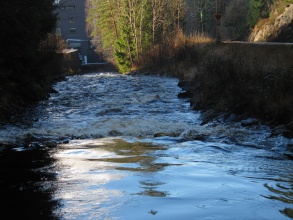Case study:Dam removal at Grönkullen, River Rolfsån
Project overview
| Status | Complete |
|---|---|
| Project web site | |
| Themes | Fisheries, Habitat and biodiversity, Hydropower |
| Country | Sweden |
| Main contact forename | Andreas |
| Main contact surname | Bäckstrand |
| Main contact user ID | User:Arolam |
| Contact organisation | Länsstyrelsen västra Götalands län |
| Contact organisation web site | http://projektwebbar.lansstyrelsen.se/rolfsan/Sv/folj-atgardsarbetet/Pages/soran.aspx?keyword=gr%C3%B6nkullen |
| Partner organisations | Municipality of Bollebygds |
| Parent multi-site project | |
| This is a parent project encompassing the following projects |
No |
Project summary
Grönkullen hydro power station is located in one of the upstream tributaries of River Rolfså, River Sörån. Restorations took place after the county administrative board wanted to make migration possible for lake dwelling brown trout in lake Lygnern. Because a chemical plant and a railway are situated next to the river and there is a possible concentration of chemicals in the river, investigations were accomplished to find out whether the dam removal has any effect to the stability conditions. Conclusion was that there would not be any significant effect of the dam removal to the stability or water levels of the river. Investigations were made in 2002-2004 and the municipality of Bollebygds bought the plant 2005 to be able to remove the dam.
Restoration was done in 2005. A new river was rebuilt upstream and downstream of the old dam, altogether along a 200 m stretch. A small part of the old dam was saved as a reminder of how it once was. Stones and gravel were added to the river bank. Total cost of the restoration was about 5 million Swedish crones (ca. 500 000 euros).
Monitoring surveys and results
Lessons learnt
Image gallery
|
Catchment and subcatchmentSelect a catchment/subcatchment
Catchment
Subcatchment
Other case studies in this subcatchment: Apelnäs fishway at River Rolfså, Biologisk återställning i Rolfsåns vattensystem, Bosgården nature-like fishway at River Rolfså, Restorations of River Nolån-Hulta dam removal, ´Restorations of River Nolån-Bypass channel in Hulta Hydro power plant, ´Restorations of River Nolån-Fishway in Forsa hydro power plant, Ålgårda nature-like bypass channel at River Rolfsån
Site
Project background
Cost for project phases
Supplementary funding informationThe total costs were about 5 million Swedish crones including investigations, purchase of appropriate rights and their implementation, demolition of the dam and river restoration measures.
Reasons for river restoration
Measures
MonitoringHydromorphological quality elements
Biological quality elements
Physico-chemical quality elements
Any other monitoring, e.g. social, economic
Monitoring documents
Additional documents and videos
Additional links and references
Supplementary InformationEdit Supplementary Information
| ||||||||||||||||||||||||||||||||||||||||||||||||||||||||||||||||||||||||||||||||||||||||||||||||||||||||||||||||||||||||||||||||||||||||||||||||||||||||||||||||||||||||||||||||||||||||||||||||||||||||




